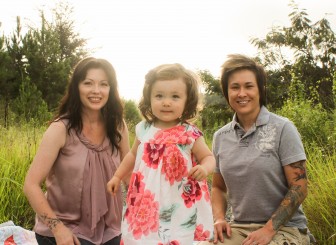Southeast is Home to Largest LGBT Population, Report Finds
Alexa and Barbie Batey met 12 years ago while playing in a Birmingham softball league. Alexa played third base. Barbie played left field.
“I had the best view ever,” she laughs.
Barbie thought Alexa was going to be a terrible softball player because she’s very feminine and wore pink outfits.
“And I was like, ‘She’s going to suck,'” Barbie says. “But she was awesome.”
Barbie was too shy to ask Alexa out, but eventually she worked up the courage to start talking to her. They started dating and for more than a decade have been apart only a handful of times. They got married in Washington D.C. in 2013 before gay marriage was legal in Alabama. They started a family two years ago and now have a daughter.
Alexa and Barbie were born and raised in Alabama, one of the most conservative states in the nation. Both say discrimination has never been an issue except by one person, Barbie’s mother. She’s Christian and doesn’t accept their lifestyle. Barbie’s relationship with her mother is rocky, but she tries not to think about it.
The Southeast is home to roughly 35 percent of LGBT people in the U.S., the largest LGBT population in the country, according to data compiled by the Williams Institute at UCLA. This find might seem surprising to some since most Southeastern states have few or no policies protecting LGBT people. A team of researchers in Georgia are seeking to learn more about the lives of LGBT people in the South. Eric Wright, who chairs the sociology department at Georgia State University, says there are a number of reasons why so many LGBT people call this region home.
“One of which is that the cost of living generally speaking is lower in the U.S. South than in other parts of the country,” he says. “There’s also been what some researchers have called a reverse migration, particularly of minorities.”
That means many Southern LGBT people who migrated to more progressive areas of the country are returning to the Southeast. To find out why so many call this place home, Wright and his research partner, Ryan Roemerman with the LGBT Institute created what they call the Southern Survey. It’s a comprehensive study that seeks to examine the lives of LGBT people across 14 Southern states.
“One of the things that we want to be able to accomplish through this survey is to be able to provide our non-profit partners across the South with data that they can use for policy development, grassroots organizing and fundraising,” Roemerman says.
The survey is by and for LGBT people in the South. This may help them better understand individual needs of the community, such as housing for transgender people or health services for lesbians living in rural areas, Wright says . And, he says, it will also help decipher the needs of this community in different Southern states. According to the LGBT Institute, more than half of the 100 anti-LGBT bills proposed this year were drafted in Southeastern states.
The survey is open through this month and the team expects to release its findings early next year.
Trump sets 50% tariff rate for Brazil, blasting treatment of former far-right president
President Trump defended former Brazilian President Jair Bolsonaro, who is accused of plotting an attempted coup following his loss in the 2022 election.
Former White House doctor declines to testify in GOP probe of Biden’s mental acuity
Kevin O'Connor cited doctor-patient confidentiality and his Fifth Amendment right against self-incrimination in deciding not to answer questions from Republicans on the House Oversight Committee.
Celine Song had too much fun as a matchmaker
Filmmaker Celine Song isn't religious, but that doesn't stop her from seeing certain dead insects as signs in her life and treating a good meal like prayer.
Diocese of San Bernardino issues dispensation saying Catholics who fear ICE don’t have to attend Mass
The diocese is the first in the U.S. to issue a special dispensation because of fears over immigration detentions.
Supreme Court blocks part of Florida’s immigration law
Immigrant rights organizations sued the state arguing that its new law conflicts with federal immigration law, and under longstanding Supreme Court precedent, states must bow to federal law in the event of such conflicts.
Clinging to a tree, and praying: how a family survived the Texas flash floods
"I thought my mom was going to die in front of me," said Taylor Bergmann, a 19-year-old who fought to save the people in his family after the Guadalupe River smashed through their home.







